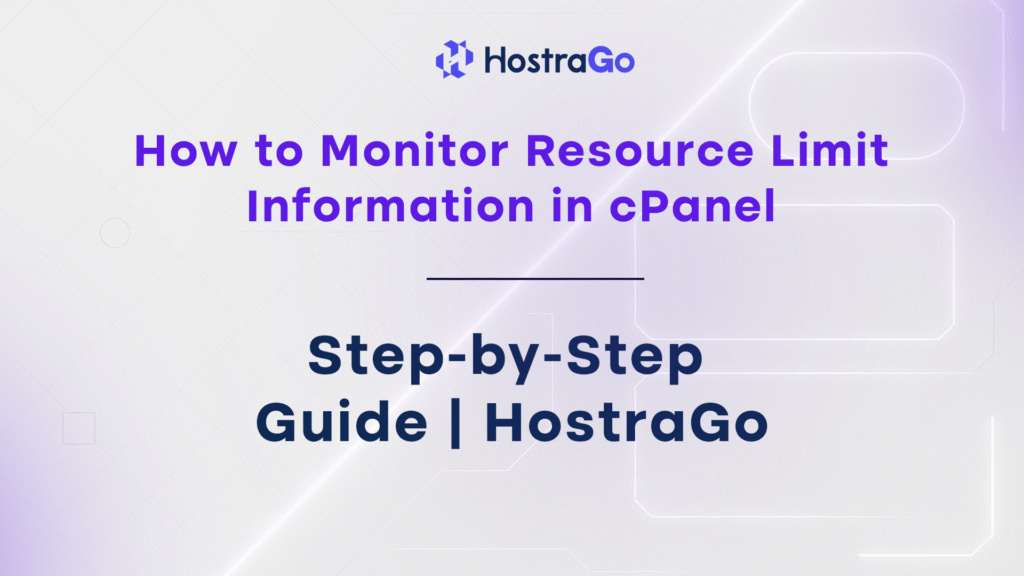In today’s digital age, maintaining peak website performance is essential—especially for business and personal websites hosted on shared servers. If your site begins to load slowly, throw unexpected errors, or even experience downtime, it could mean you’ve hit your hosting limits. That’s exactly why learning how to monitor resource limit information in cPanel is crucial for ensuring your website stays fast, stable, and responsive.
cPanel—a popular web hosting control panel—offers built-in tools that help you track your hosting account’s usage. Understanding how to monitor resource limit information in cPanel gives you insights into your site’s CPU, memory, and input/output usage so you can detect problems early, optimize performance, or upgrade your hosting plan if needed.
Why Monitoring Resource Limits Is Important
Web hosting plans have predefined limits for:
- CPU Usage
- Memory (RAM) Usage
- Input/Output (I/O)
- Entry Processes
- Number of Processes
Exceeding these limits can lead to:
- 503 Errors
- Site slowness
- Temporary suspension of processes
That’s why HostraGo recommends checking your cPanel’s resource usage regularly to avoid issues and upgrade your hosting plan if needed.
🔗 Related: Best Web Hosting in India – HostraGo
Step-by-Step: How to Monitor Resource Limit Information in cPanel
Step 1: Log in to Your cPanel Account
Go to your cPanel login URL provided by your hosting provider (e.g., https://yourdomain.com/cpanel) and log in using your credentials.
Step 2: Locate the “Metrics” Section
Once you’re inside the cPanel dashboard, scroll down to find the Metrics section.

Step 3: Click on “Resource Usage”
Under Metrics, click on the Resource Usage icon. This tool provides detailed insights into your account’s usage history.

Step 4: View Current Usage Stats
Here, you’ll see whether your account is currently within limits or has hit resource limits. The message might show:
- “Your site had no issues in the past 24 hours.” or
- “Your account has been limited within the past 24 hours.”

Step 5: Click on “Details” for Breakdown
Click the “Details” button to view a graph and breakdown of usage over time. You’ll see limits related to:
- CPU
- RAM
- I/O
- Entry processes

How Is the Snapshot Helpful to Troubleshoot CPU Resource Limits in cPanel?
When your website hosted on a shared server experiences slow performance, or cPanel indicates that your CPU resources have been maxed out over the past 24 hours, it’s a clear sign that something is consuming more than its fair share of system power. In such cases, knowing how the snapshot helps to troubleshoot CPU resource limits in cPanel becomes incredibly important for resolving performance issues and maintaining website stability.
To begin, simply navigate to your cPanel account’s Resource Usage section and click on the Snapshot tab. This tab offers an in-depth view of your system’s real-time and historical activity. By analyzing this data, you can pinpoint the root causes behind high CPU usage, whether it’s due to heavy plugins, inefficient scripts, database overloads, or suspicious traffic.
Here’s what the Snapshot tab reveals and how each section can help:
Snapshot Details Breakdown
Process List
This section shows all the currently active processes running on the server. It includes essential details like:
- PID (Process ID) – A unique number for each active process.
- User – Who initiated the process.
- CPU Time – Total CPU consumed.
- Memory Usage – How much RAM the process is using.
- Priority, Command & Status – Understand what’s running, its priority, and whether it’s sleeping or actively running.
This data allows you to detect resource-hogging scripts or tasks, helping you and your developer optimize or terminate unnecessary processes.
Database Queries
Here, you’ll find ongoing MySQL or MariaDB queries. This is useful if your site relies heavily on a CMS like WordPress or Joomla. Long-running or inefficient queries can lead to performance issues—this tool helps you spot and resolve them before they impact user experience.
HTTP Queries
This section displays real-time HTTP requests. If you’re facing sudden traffic surges or think a script might be misbehaving (e.g., AJAX or API calls), this view helps pinpoint external or internal traffic sources causing the load.
FAQs – Monitor Resource Usage in cPanel
Q1: How often should I check my resource usage?
A: Weekly is a good starting point, but check more often if your site experiences traffic spikes.
Q2: What if I keep hitting resource limits?
A: Either optimize your website (caching, compressing images) or consider upgrading your hosting.
Q3: Can I set up alerts for usage limits?
A: Most shared hosting doesn’t offer this, but VPS or cloud solutions may allow usage monitoring and alert integration.
Final Thoughts
How to Monitor Resource Limit Information in cPanel helps ensure your website runs smoothly, avoids downtime, and maintains user satisfaction. With HostraGo’s hosting plans and expert support, staying on top of your resource usage has never been easier.
💬 Need help optimizing your hosting? Contact HostraGo Support


